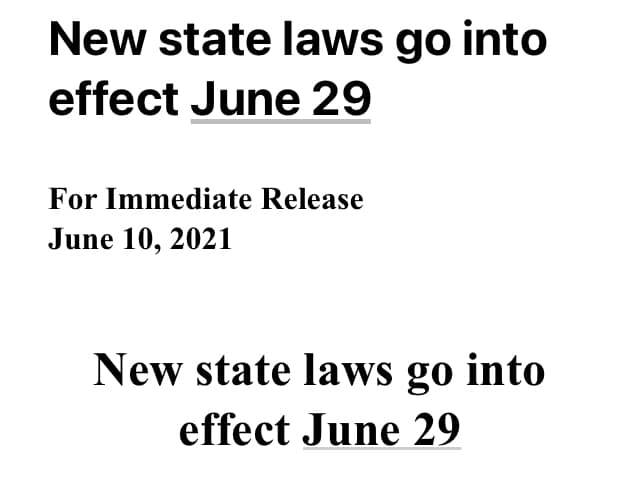
From the Legislative Research Commission:
"House Bill 312 will revise the states [sic] open records laws. It will limit the ability of people who do not live, work or conduct business in Kentucky to obtain records through open records laws. These restrictions do not apply to out-of-state journalists. The legislation specifies that open records requests can be made via email. It also calls for a standardized form to be developed for open records request but does not require its use. It will allow the legislative branch to make final decisions that can't be appealed regarding decisions on open records requests it receives. The bill will allow government agencies up to five days to respond to open records requests."
https://apps.legislature.ky.gov/record/21rs/hb312.html
This summary omits the new exceptions to the open records law, one of which contained an emergency clause and has already taken effect. HB 273 authorizes nondisclosure of "photographs or videos that depict the death, killing, rape, or sexual assault of a person," such as the bystander video in the George Floyd case or the surveillance video in the David McAtee case, if the photos/videos are in the possession of a public agency and requested under the open records law.
https://apps.legislature.ky.gov/record/21rs/hb273.html
The sponsor of this ill-conceived exception pointed to the Marshall County High School shootings and the need to protect the privacy interests of survivors, survivors' family members, and victims' family members from disclosure of the photos and videos made at the scene of the 2018 tragedy. He was deaf to the argument that — unless the photos or videos depicted the law enforcement or school officials response — they would be excluded from public inspection under the 45 year old personal privacy exception, KRS 61.878(1)(a).
https://apps.legislature.ky.gov/law/statutes/statute.aspx?id=51393
Of the two remaining exceptions — one relating to public defender client and case files and the other amending the existing exception for "public records or information which federal law or regulation prohibit disclosure of" (KRS 61.878(1)(k)) by adding the phrase "or state law" — only the latter raises concern. This is because the existing exception that follows KRS 61.878(1)(k) already authorizes nondisclosure of "records and information made confidential by enactment of the General Assembly (KRS 61.878(1)(l))."
Enactments of the General Assembly are, of course, state laws. The newly added language may be a harmless redundancy or it may portend something worse.
The summary also minimizes the damage of the two greatest changes to the open records law, namely, the residency requirement— limiting use of the open records law to "residents"—and the legislature's decision to effectively remove its public records from public scrutiny.
This press release from the Legislative Research Commission is a masterwork of understatement in its description of the changes to the open records law.
The Kentucky Open Government Coalition will offer a free thirty minute webinar, entitled "Open Records 2021: What do I need to know?," on Monday, June 21, at 10:00 a.m. The webinar will be hosted by Coalition co-director and First Amendment/Open Government expert Jeremy Rogers. Jeremy is a partner in the Louisville office of Dinsmore & Shohl. Since joining the firm in 2002, Jeremy has litigated many of Kentucky's groundbreaking open government cases.
The Kentucky Open Government Coalition urges the public and public agencies to be prepared for the changes that are soon to come.
Details to follow.


